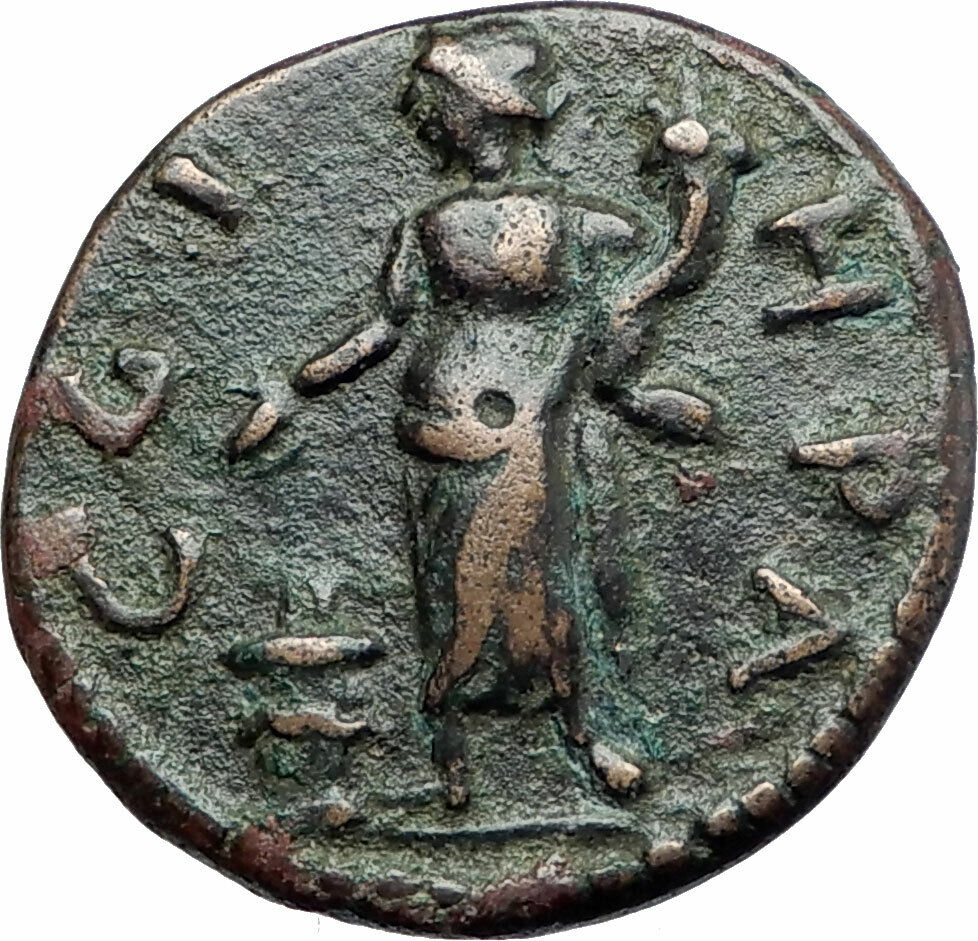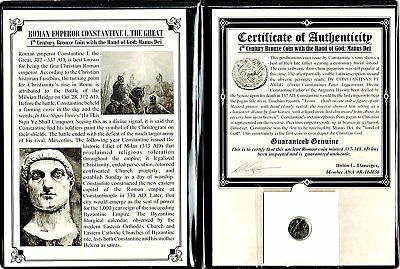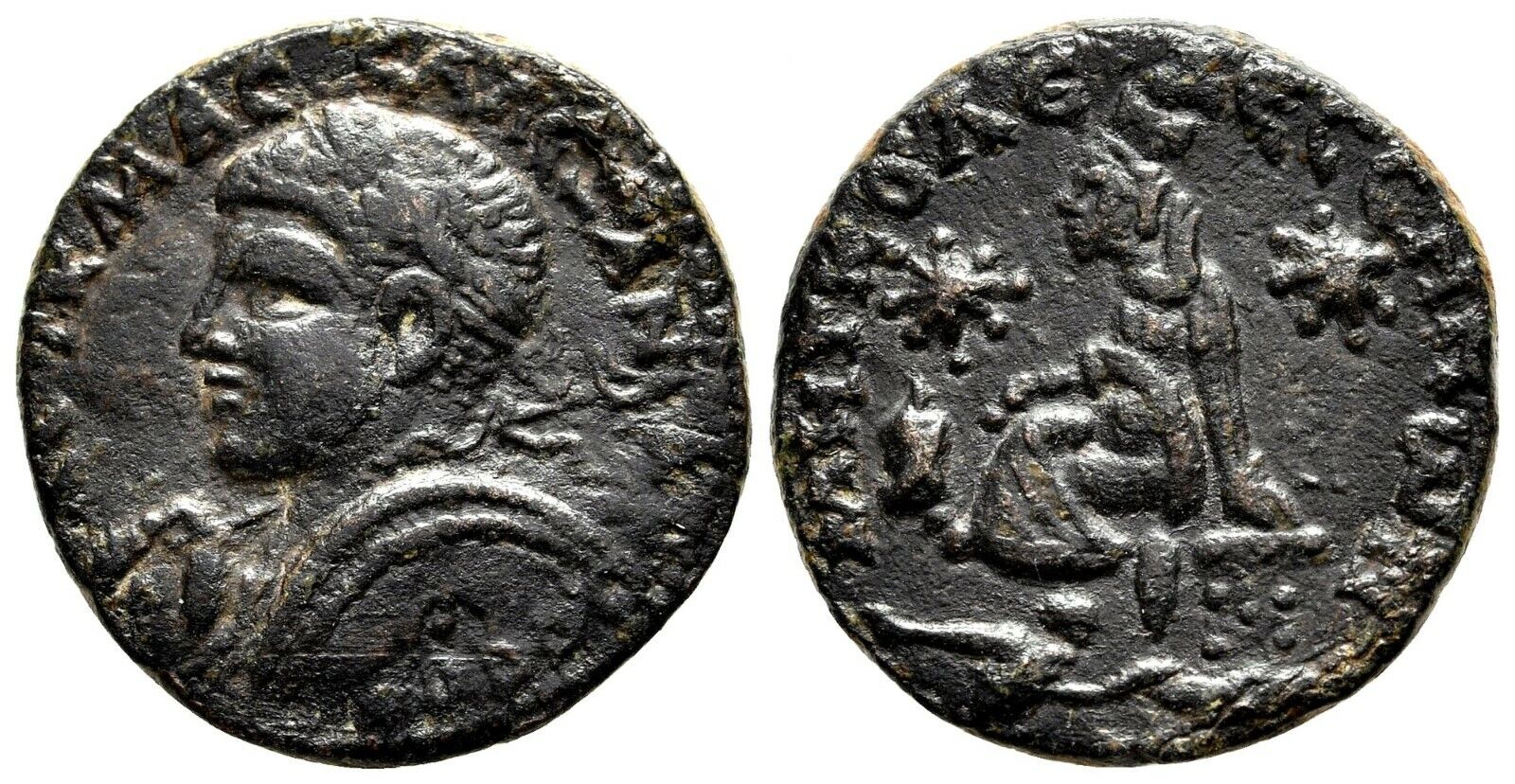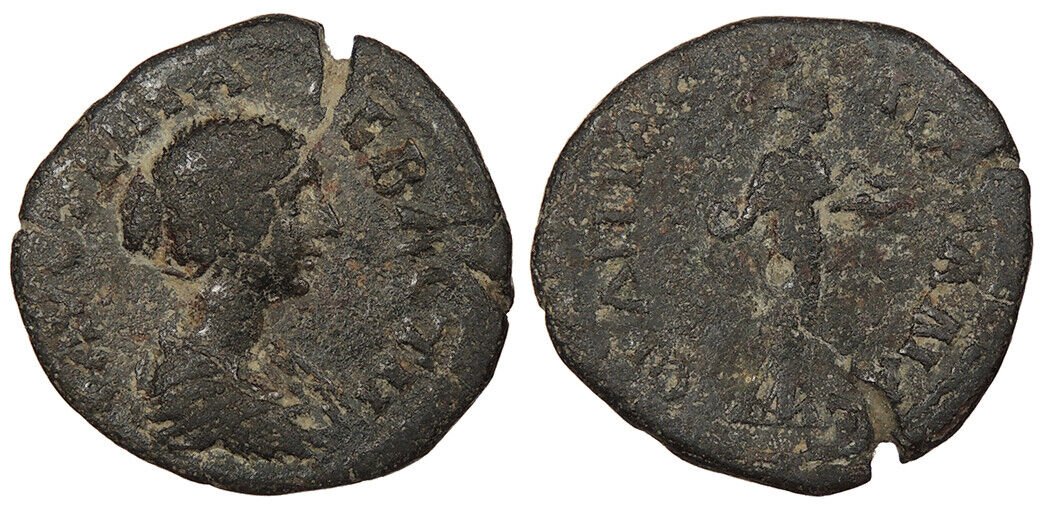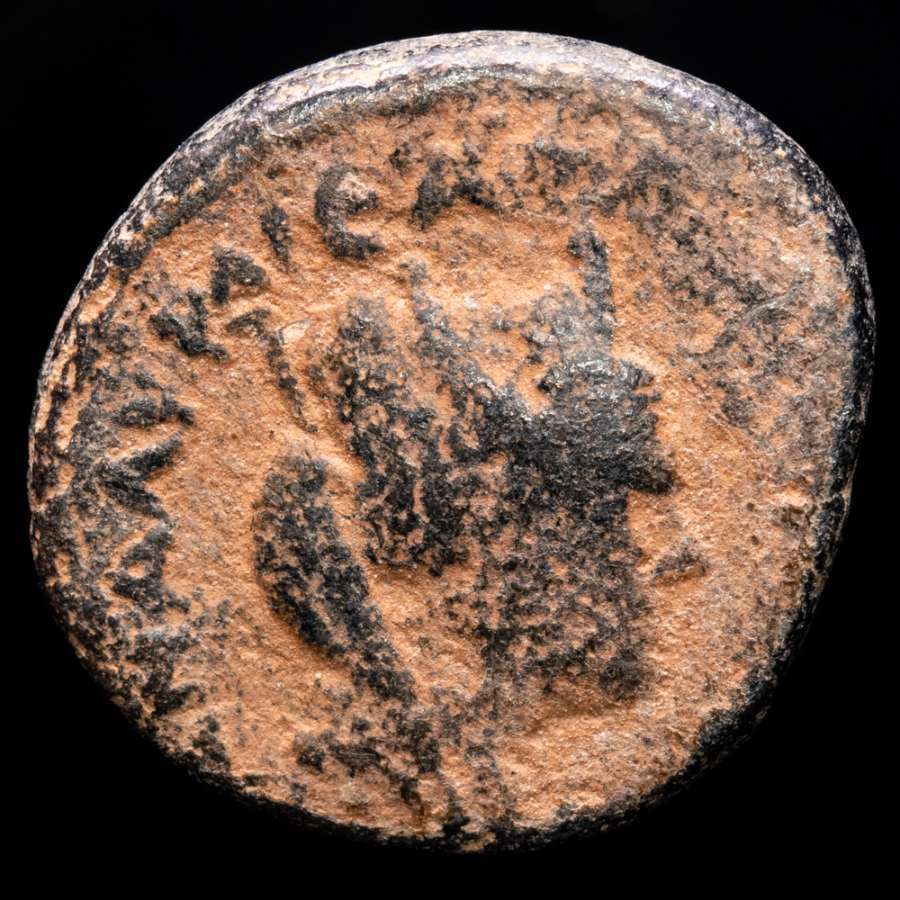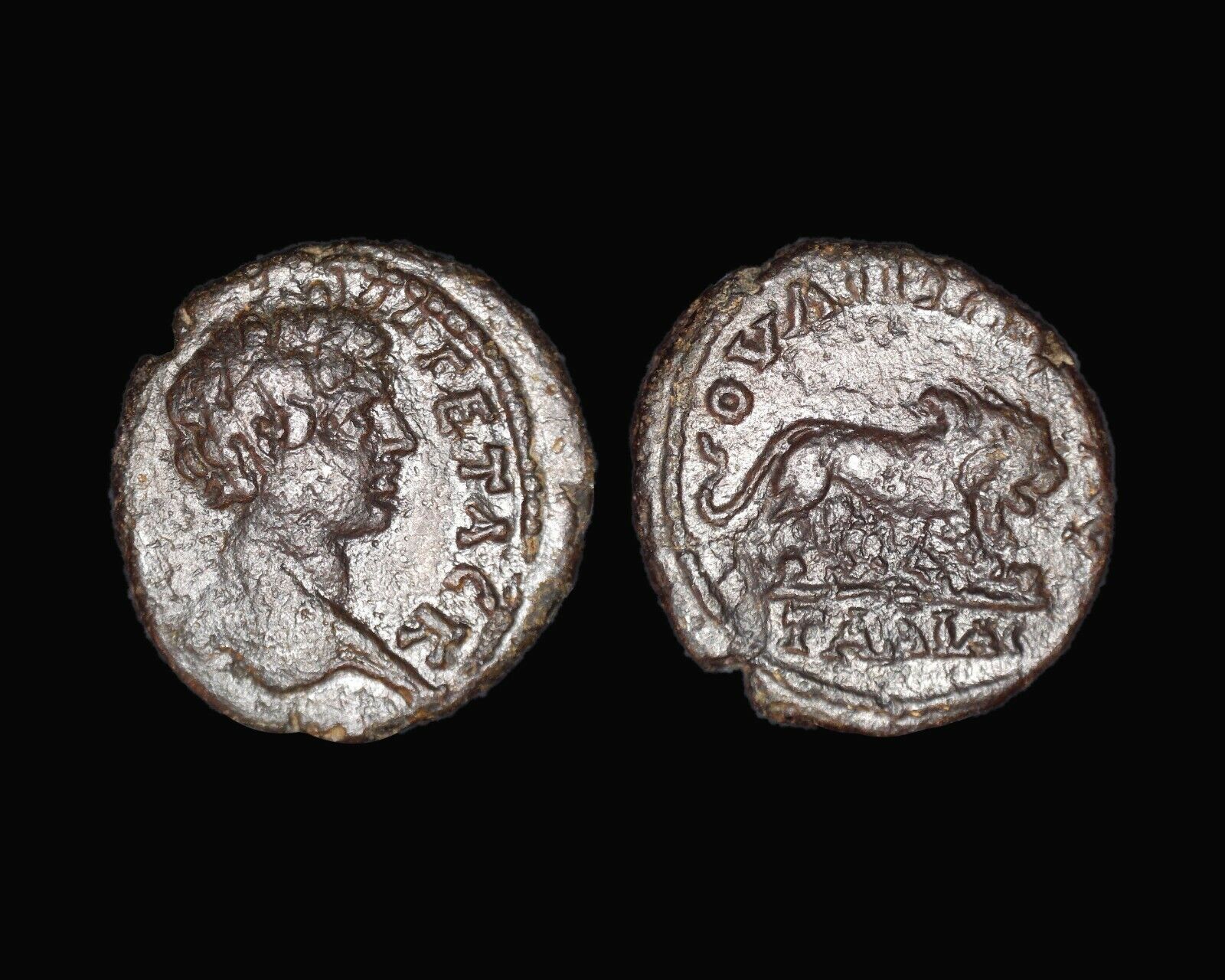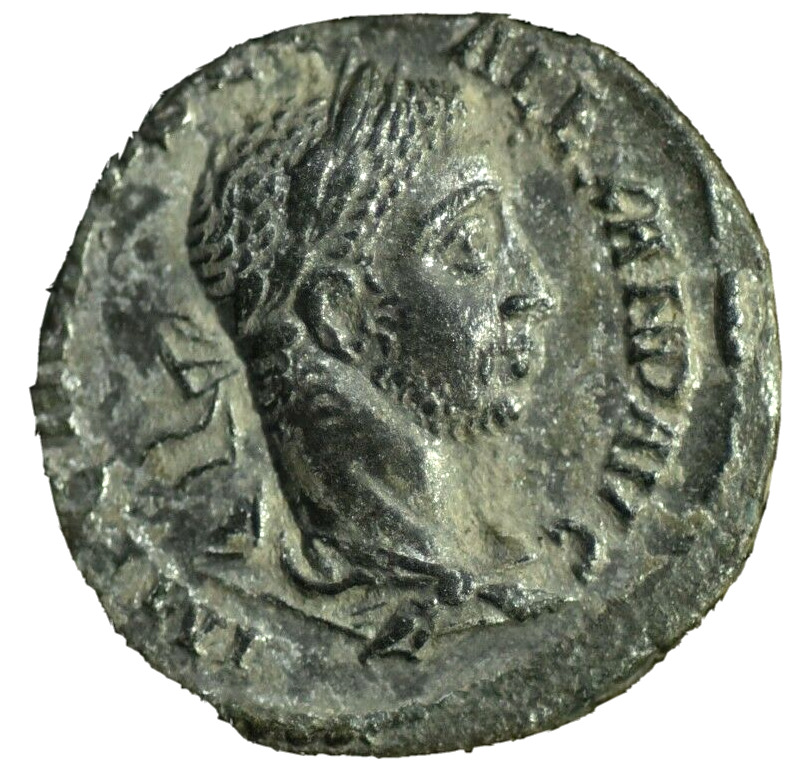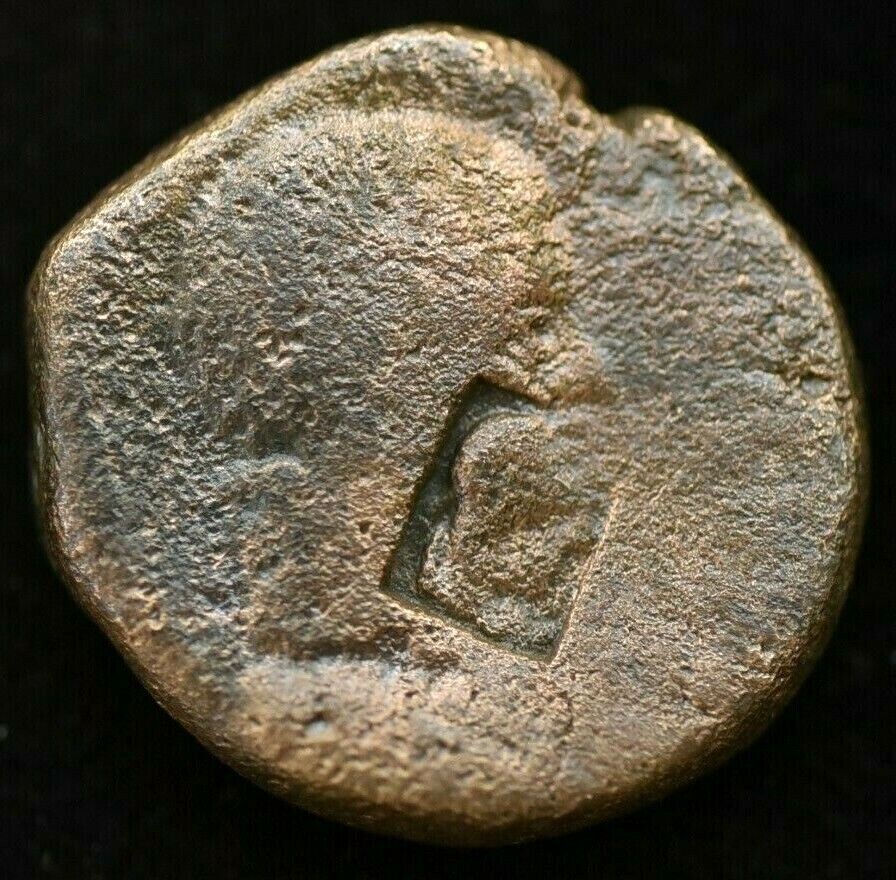-40%
SEVERUS ALEXANDER 222AD Parium Parion Mysia Authentic Ancient Roman Coin i79987
$ 147.2
- Description
- Size Guide
Description
Item:i79987
Authentic Ancient Coin of:
Severus Alexander
-
Roman Emperor:
222-235 A.D.
Bronze 20mm (5.31 grams) of
Parion
(Parium) in
Mysia
IMP CAEƧ L ƧEP ƧEV ALEXANDER, laureate bust right, wearing paludamentum and cuirass.
C G I H PA, Genius of the people of Rome standing left holding cornucopia and sacrificing from patera over lit altar.
Parium (or
Parion
), a city of
Mysia
, founded circa 710 B.C. on the north coast of the Troad, on the shores of the Propontis, between
Lampsakos
and
Priapos
, was founded by a colony from
Miletos
, mingled with natives of
Paros
and
Erythrae
, and became a flourishing seaport through the excellence of its harbor, having a better harbor than that of Priapos. Under Augustus it was made a Roman colony, by the name of Colonia Pariana Julia Augusta. It was a renowned seat of the worship of
Eros
,
Dionysus
, and
Apollo
.
You are bidding on the exact item pictured, provided with a Certificate of Authenticity and Lifetime Guarantee of Authenticity.
The Genius was a protection spirit, analogous to the guardian angels invoked by the Church of Rome. The belief in such spirits existed in Greece and at Rome. The Greeks called them Daemons, and appear to have believed in them from the earliest times, though Homer does not mention them. Hesiod says that the Daemons were 30,000 in number, and that they dwelled on earth unseen by mortals, as the ministers of Zeus, and as the guardians of men and justice. He further conceives them to be the souls of the righteous men who lived in the golden age of the world. The Greek philosophers took up this idea, and developed a complete theory of daemons. Thus we read in Plato, that daemons are assinged to men at the moment of their birth, that they accompany men through life, and after death conduct their souls to Hades. Pindar, in several passages of the spirit watching over the fate of man from the hour of his birth. The daemons are further described as ministers and companions of the gods, who carry the prayers of men to the gods, and the gifts of the gods to men, and accordingly float in immense numbers in the space between heaven and earth. There was also a distinct class of daemons, who were exclusively the ministers of the gods.
The Romans seem to have received their notions respecting the genii from the Etruscans, though the name Genius itself is Latin (it is connected with
gi-gn-o, gen-ui,
and equivalent in meaning to generator or father). The genii of the Romans are the powers which produce life (
dii genitales
), and accompany man through it as his second or spiritual self. They were further not confined to man, but every living being, animal as well as man, and every place had its genius. Every human being at his birth obtained (
sortitur
) a genius, who he worshipped as
sanctus et sanctissimus deus
, especially on his birthday, with libations of wine, incense, and garlands of flowers. The bridal bed was sacred to the genius, on account of his connection with generation, and the bed itself was called
lectus genialis
. On other merry occasions, also , sacrifices were offered to the genius, and to indulge in merriment was not unfrequently expressed by
genio indulgere, genium curare,
or
placarae.
The whole body of the Roman people had its own genius, who is often seen represented on coins of Hadrian and Trajan. He was worshipped on sad as well as joyous occasions; thus, sacrifices were offered to him at the beginning of the 2nd year of the war with Hannibal. The genii are usually represented in works of art as winged beings. The genius of a place appears in the form of a serpent eating fruit placed before him.
Severus Alexander
-
Roman Emperor
: 222-235 A.D.
Caesar: 221-222 A.D. (under
Elagabalus
)
| Son of
Julia Mamaea
| Husband of
Orbiana
| Grandson of
Julia Maesa
| Nephew of
Julia Soaemias
| Cousin of
Elagabalus
| Second-cousin of
Caracalla
and
Geta
| Great-nephew of
Septimius Severus
and
Julia Domna
|
Severus Alexander
(Latin:
Marcus Aurelius Severus Alexander Augustus
; 1 October 208 - 19 March 235) was Roman Emperor from 222 to 235 and the last emperor of the Severan dynasty. He succeeded his cousin Elagabalus, upon the latter's assassination in 222, and was ultimately assassinated himself, marking the epoch event for the Crisis of the Third Century - nearly 50 years of civil wars, foreign invasion, and collapse of the monetary economy, though this last part is now disputed.
Alexander was the heir apparent to his cousin, the 18-year-old Emperor who had been murdered along with his mother Julia Soaemias, by his own guards, who, as a mark of contempt, had their remains cast into the Tiber river. He and his cousin were both grandsons of the influential and powerful Julia Maesa, who had arranged for Elagabalus' acclamation as emperor by the famous Third Gallic Legion. It was the rumor of Alexander's death that triggered the assassination of Elagabalus and his mother.
As emperor, Alexander's peace time reign was prosperous. However, Rome was militarily confronted with the rising Sassanid Empire and growing incursions from the tribes of Germania. He managed to check the threat of the Sassanids. But when campaigning against Germanic tribes, Alexander attempted to bring peace by engaging in diplomacy and bribery. This alienated many in the Roman Army and led to a conspiracy to assassinate and replace him.
Domestic achievements
Under the influence of his mother, Alexander did much to improve the morals and condition of the people, and to enhance the dignity of the state. He employed noted jurists to oversee the administration of justice, such as the famous jurist Ulpian. His advisers were men like the senator and historian Cassius Dio, and it is claimed that he created a select board of 16 senators, although this claim is disputed. He also created a municipal council of 14 who assisted the urban prefect in administering the affairs of the 14 districts of Rome. Excessive luxury and extravagance at the imperial court were diminished, and he restored the Baths of Nero in 227 or 229; consequently, they are sometimes also known as the Baths of Alexander after him.
Upon his accession he reduced the silver purity of the denarius from 46.5% to 43% - the actual silver weight dropped from 1.41 grams to 1.30 grams; however, in 229 he revalued the denarius, increasing the silver purity and weight to 45% and 1.46 grams, respectively. The following year he decreased the amount of base metal in the denarius while adding more silver, raising the silver purity and weight again to 50.5% and 1.50 grams. Also during his reign taxes were lightened; literature, art and science were encouraged; and, for the convenience of the people, loan offices were instituted for lending money at a moderate rate of interest.
In religious matters, Alexander preserved an open mind. It is said that he was desirous of erecting a temple to Jesus but was dissuaded by the pagan priests. He allowed a synagogue to be built in Rome, and he gave as a gift to this synagogue a scroll of the Torah known as the Severus Scroll.
In legal matters, Alexander did much to aid the rights of his soldiers. He confirmed that soldiers could name anyone as heirs in their will, whereas civilians had strict restrictions over who could become heirs or receive a legacy. Alexander also confirmed that soldiers could free their slaves in their wills. Additionally, he protected the rights of soldiers to their property when they were off on campaign and reasserted that a soldier's property acquired in or because of military service (his
castrense peculium
) could be claimed by no one else, not even the soldier's father.
Persian War
On the whole, Alexander's reign was prosperous until the rise, in the east, of the Sassanids under Ardashir I. Of the war that followed there are various accounts. According to Herodian, the Roman armies suffered a number of humiliating setbacks and defeats, while according to the Historia Augusta as well as Alexander's own dispatch to the Roman Senate, he gained great victories. Making Antioch his base, he marched at the head of his troops towards Ctesiphon, but a second army was destroyed by the Persians, and further losses were incurred by the retreating Romans in Armenia.
Nevertheless, although the Sassanids were checked for the time, the conduct of the Roman army showed an extraordinary lack of discipline. In 232 there was a mutiny in the Syrian legion, who proclaimed Taurinus emperor. Alexander managed to suppress the uprising, and Taurinus drowned while attempting to flee across the Euphrates. The emperor returned to Rome and celebrated a triumph in 233.
Germanic War
After the Persian war, Alexander returned to Antioch with the famous Origen, one of the greatest Fathers of the Christian Church. Alexander's mother, Julia Mammaea, asked for Origen to tutor Alexander in Christianity.
While Alexander was being educated in the Christian doctrines, the northern portion of his empire was being invaded by Germanic and Sarmatian tribes. A new and menacing enemy started to emerge directly after Alexander's success in the Persian war. In A.D 234, the barbarians crossed the Rhine and Danube in hordes that even caused panic at the gates of Rome. The soldiers serving under Alexander, who were already demoralized after their costly war against the Persians, were further discontented with their emperor when their homes were destroyed by the barbarian invaders.
As word of the invasion spread, the Emperor took the front line and went to battle against the Germanic invaders. The Romans prepared heavily for the war, building a brigade of ships to carry the entire battalion across. However, at this point in Alexander's career, he still knew little about being a general. Because of this, he hoped the sole threat of his armies might be enough to persuade the Germanics to surrender. Severus enforced a strict military discipline in his men that sparked a rebellion among the Germanic legions. Due to incurring heavy losses against the Persians, and on the advice of his mother, Alexander attempted to buy the Germanic tribes off, so as to gain time.
It was this decision that resulted in the legionaries' looking down upon Alexander. They considered him dishonorable and feared he was unfit to be Emperor. Under these circumstances the army swiftly looked to replace Alexander.
Gaius Iulius Verus Maximinus was the next best option. He was a soldier from Thrace who had a golden reputation and was working hard to increase his military status. He was also a man with superior personal strength, who rose from peasantry to ultimately being the one chosen for the throne. With the Thracian's hailing came the end of the Severan Dynasty. With Severus' own army growing with animosity and turning against him, the path for his assassination was paved.
Death
Alexander was forced to face his German enemies in the early months of 235. By the time he and his mother arrived, the situation had settled, and so his mother convinced him that to avoid violence, trying to bribe the German army to surrender was the more sensible course of action. According to historians, it was this tactic combined with insubordination from his own men that destroyed his reputation and popularity. Pusillanimity was responsible for the revolt of Alexander's army, resulting in Severus' falling victim to the swords of his own men, following the nomination of Maximinus as emperor.
Alexander was assassinated March 19, 235 together with his mother, in a mutiny of the Legio XXII
Primigenia
at Moguntiacum (Mainz) while at a meeting with his generals. These assassinations secured the throne for Maximinus.
Lampridius documents two theories that elaborate on the Severus' assassination. The first claims that the disaffection of Mammaea was the main motive behind the homicide. However, Lampridius makes it clear that he is more supportive of an alternative theory, that Alexander was murdered in Sicilia (located in Britain).
This theory has it that, in an open tent after his lunch, Alexander was consulting with his insubordinate troops, who compared him to his cousin Elagabalus, the divisive and unpopular Emperor whose own assassination paved the way for Alexander's reign. A German servant entered the tent and initiated the call for Alexander's assassination, at which point many of the troops joined in the attack. Alexander's attendants fought against the other troops but could not hold off the combined might of those seeking the Emperor's assassination. Within minutes, Alexander was dead.
After Alexander's death his economic policies were completely discarded, and the Roman currency was devalued. This marked the beginning of the Crisis of the Third Century, a time period in which the Roman empire came close to falling apart entirely.
Frequently Asked Questions
Mr. Ilya Zlobin
, world-renowned expert numismatist, enthusiast, author and dealer in authentic ancient Greek, ancient Roman, ancient Byzantine, world coins & more.
Who am I dealing with?
You are dealing with Ilya Zlobin, ancient coin expert, enthusiast, author and dealer with an online store having a selection of over 15,000 items with great positive feedback from verified buyers and over 10 years experience dealing with over 57,000 ancient and world coins and artifacts. Ilya Zlobin is an independent individual who has a passion for coin collecting, research and understanding the importance of the historical context and significance all coins and objects represent. Most others are only concerned with selling you, Ilya Zlobin is most interested in educating you on the subject, and providing the largest selection, most professional presentation and service for the best long-term value for collectors worldwide creating returning patrons sharing in the passion of ancient and world coin collecting for a lifetime.
How long until my order is shipped?
Orders are shipped by the next business day (after receipt of payment) most of the time.
How will I know when the order was shipped?
After your order has shipped, you will be left positive feedback, and that date could be used as a basis of estimating an arrival date. Any tracking number would be found under your 'Purchase history' tab.
USPS First Class mail takes about 3-5 business days to arrive in the U.S. International shipping times cannot be estimated as they vary from country to country.
Standard international mail to many countries
does not
include a tracking number, and can also be slow sometimes.
For a tracking number and signature confirmation, you may want to do Express Mail International Shipping, which costs more, however, is the fastest and most secure. Additionally you may be able to receive your order in as little as 3-5 business days using this method. For Express Mail International, it may be possible to place up to 10-15 items in one package (for the one shipping cost) as it is flat rate envelope, which may be the most cost-effective, secure and fastest way to receive items internationally. Send me a message about this and I can update your invoice should you want this method.
Getting your order to you, quickly and securely is a top priority and is taken seriously here.
Great care is taken in packaging and mailing every item securely and quickly.
Please be aware, I cannot take responsibility for any postal service delivery delays, especially for international packages as it may happen in rare instances.
What is a certificate of authenticity and what guarantees do you give that the item is authentic?
Each of the items sold here, is provided with a Certificate of Authenticity, and a Lifetime Guarantee of Authenticity, issued by a world-renowned numismatic and antique expert that has identified over 57,000 ancient coins and has provided them with the same guarantee. You will be very happy with what you get with the COA; a professional presentation of the coin, with all of the relevant information and a picture of the coin you saw in the listing. Additionally, the coin is inside it's own protective coin flip (holder), with a 2x2 inch description of the coin matching the individual number on the COA.
On the free-market such a presentation alone, can be considered a - value all in itself, and it comes standard with your purchases from me,
FREE.
With every purchase, you are leveraging my many years of experience to get a more complete context and understanding of the piece of history you are getting. Whether your goal is to collect or give the item as a gift, coins presented like this could be more prized and valued higher than items that were not given such care and attention to.
Buy a coin today and own a piece of history, guaranteed.
Is there a money back guarantee?
I offer a 30 day unconditional money back guarantee. I stand behind my coins and would be willing to exchange your order for either store credit towards other coins, or refund, minus shipping expenses, within 30 days from the receipt of your order. My goal is to have the returning customers for a lifetime, and I am so sure in my coins, their authenticity, numismatic value and beauty, I can offer such a guarantee.
When should I leave feedback?
Once you receive your order, please leave a positive feedback. Please don't leave any negative feedbacks, as it happens sometimes that people rush to leave feedback before letting sufficient time for their order to arrive. Also, if you sent an email, make sure to check for my reply in your messages before claiming that you didn't receive a response. The matter of fact is that any issues can be resolved, as reputation is most important to me. My goal is to provide superior products and quality of service.
How and where do I learn more about collecting ancient coins?
Visit the
"Guide on How to Use My Store"
for on an overview about using my store, with additional information and links to all other parts of my store which may include educational information on topics you are looking for.
